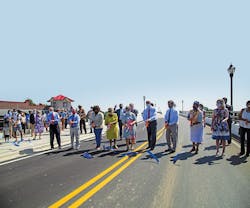How one state DOT is addressing the impacts of the coronavirus pandemic on operations and infrastructure
There was a 2020 meme that got a good bit of traction on social media.
It simply stated the year in plain black lettering—2020—and its creator gave it, like a restaurant review, a one-star rating. For many, that pretty much sums up our experiences to date. No matter who you encounter, from friends and family members to colleagues and contractors, COVID-19 has altered how we interact, operate, and function on a daily basis.
For the Delaware DOT (DelDOT), it was business as usual until March 13, 2020, when restrictions were first implemented—restrictions that included the closing of cash toll collections, directing Division of Motor Vehicle (DMV) customers to online services, and postponing in-person events such as public workshops.
Then, on March 22, Gov. John Carney issued a stay-at-home order that would close all nonessential business 48 hours later. However, state government employees were deemed essential, as were highway and road construction workers, building construction crews, engineering personnel, and other professional services keeping DelDOT operational, which presented a new challenge.
The challenge for DelDOT’s leadership was how to continue functioning day-to-day while ensuring the safety and well-being of the public and our employees when a significant amount of DelDOT’s responsibilities involve human interaction. From planning meetings, to roadwork, to driver’s license renewals, continuing to provide services and keeping projects moving forward was a monumental task. With roughly 2,000 employees working across the department, the solutions varied from division to division, but through collaboration, intensive communication, and innovation DelDOT intended to meet the challenge.
Making the transition
The state’s Department of Technology and Information (DTI) team worked diligently during the second half of March to transition focus from in-person customer services to a predominantly online experience. Roughly 50% of our workforce shifted to working from home and a large percentage continue to do so today in order to limit staff size in our buildings. Public workshops and advisory and group meetings entered the virtual world complete with real-time Q&A sessions, giving constituents direct access to project managers and planners. A positive takeaway from this shift since March has been increased public participation in the online and virtual services offered.
Even a pandemic could not stop Secretary of Transportation Jennifer Cohan, who utilized various platforms to attend virtual conferences and summits—all of which had made the rapid transfer to the virtual realm—as well as COVID-19 briefings. She conducted Virtual Town Hall Meetings to keep DelDOT’s employees constantly updated on the state of the pandemic, on how the department was responding, and ensuring that her employees’ needs were met. Secretary Cohan led by example and made numerous appearances at events across the state showcasing the work of employees and contractors who continued to work safely during the pandemic.
One of the biggest hurdles to overcome was the question of what to do at the DMV where so many employees and customers interact in close proximity. We urged Delawareans to take advantage of more than 20 online services, including driver’s license renewal. To keep lobby crowds to a minimum, late fees were waived for vehicle registration and driver license renewals. We encouraged exclusive use of the drive-through and self-serve kiosk services and moved to a “by appointment only” model for those needing in-person assistance. While restrictions at the DMV have subsequently eased, plexiglass barriers have been installed at all DMV windows, temperatures are taken for all persons upon entry, and thermal scanners are being implemented for all individuals entering the state’s four DMV locations.
Another challenge—a much larger and perhaps more complicated one—is the state’s public transportation system, which is also operated by DelDOT. Thousands of Delawareans rely on DART First State each and every day to travel to and from work, reach doctor’s appointments, access child care opportunities, and enjoy other essential destinations. With ridership decreasing by more than 80%, service schedules were modified, and fare collection was temporarily suspended. During the state’s phased reopening plan, bus capacity was reduced to 40%, front door boardings were prohibited, seats were marked to ensure proper social distancing, and riders and operators were required to wear face masks unless medically unable to do so. All buses were also subjected to new cleaning procedures with an intensive sanitization performed monthly. As of this writing, work continues on initiatives such as tap-n-go payment systems, and retrofitting buses to ease cleaning and even adding PPE products to vending machines at key transit centers and hubs.
Yes, we’re open
Here at DelDOT we were and continue to remain operational through the pandemic. In truth, falling behind was never an option—for it would have created a domino effect on important future projects already scheduled for 2021 and beyond.
Maintenance and operations employees and contractors embraced new protective mandates to slow the spread of the virus. Teams of two—a reduction of the norm—would now execute all field work to reduce the number of people traveling in vehicles. Social distancing on worksites also became a new reality. Engineers, planners, and everyone who worked behind the scenes on a given project continued, seamlessly, to process project bids, land development reviews, approvals, and permits; to attend virtual workshops and meetings; and respond to inquiries. After all, DelDOT’s mission to provide excellence in transportation for every trip, every mode, every dollar for everyone never changed; it was just a matter of changing the method of execution.
“While the pandemic presented unexpected challenges, our employees and contractors continued to innovate and find ways to not only continue working, but expedite work by taking advantage of the significant decline in traffic volumes statewide,” said Secretary Cohan.
Thanks to the dedicated DelDOT team, the first half of 2020 saw the completion of a variety of infrastructure projects across the state totaling nearly $100 million in infrastructure investments. With the significant reduction in traffic associated with stay-at-home orders and the new and prolonged prevalence of remote work in most industries, DelDOT and its contractors were able to keep construction work alive, and were even able to increase output, which resulted in a level of productivity that might otherwise not have been graspable. The focus on keeping construction going with new safety guidelines in place preserved more than 10,000 jobs during the initial onset of the pandemic, and the construction industry held up the local economy as many other businesses paused operations.
Projects slated to start in the fall were completed before summer began, including the paving of S.R. 1 from Odessa to Smyrna. On this project, a 10-mile section of Route 1 between Middletown and Smyrna was paved in both directions to improve the road surface and give the corridor a longer life.
Another project that was able to be shoehorned into completion was the Christina River Bridge, a 470-ft multimodal bridge over the Christina River that includes two 12-ft travel lanes and a separated 14-ft bicycle and pedestrian path. Along with the bridge itself, more than 1.5 miles of new and improved roads, sidewalks, and parking were completed as scheduled. The bridge and its ancillaries’ completion was a necessity in order for DelDOT to begin the rehabilitation of I-95—which is slated for a spring 2021 start on a two-year project schedule.
“This has been an unusual year, but we continue to press forward on the largest infrastructure program in Delaware’s history,” said Gov. Carney. “Investments in our public infrastructure create good jobs, make our roadways safer, reduce the time we all spend in traffic, and generally improve quality of life for all Delawareans.”
“Although this spring presented unprecedented challenges to Delaware, DelDOT saw an opportunity to expedite public works projects while keeping Delawareans employed,” commented Bryon Short, Executive Vice President of the Delaware Contractors Association (DCA). “Working together, DelDOT and DCA’s highway contractors pushed to ensure projects were expedited for the convenience of the traveling public, while protecting both the safety of workers and taxpayer investments.”
Brian Bolender, President of the American Council of Engineering Companies (ACEC)/Delaware concurred, saying: “Infrastructure in our state is critical to the economy. We are grateful to the leadership at DelDOT for being innovative during unprecedented times.”
Today, DelDOT’s focus remains just as it was prior to the COVID-19 pandemic: To make every trip taken in Delaware safe and reliable, and to provide safe choices for travelers to access roads, rails, buses, airways, waterways, bike trails, and walking paths. Employees have done a tremendous job of working through the challenges, and the department will continue to adapt to meet the needs of all those who depend on it.


